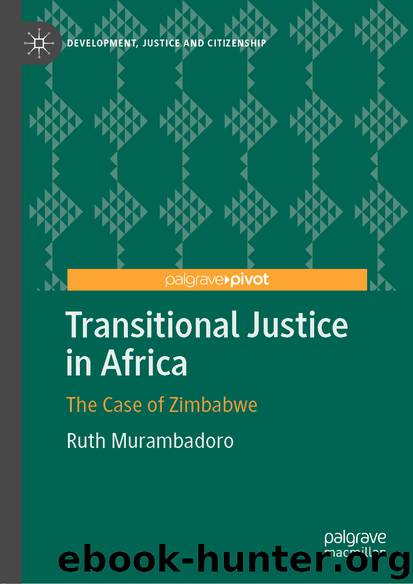Transitional Justice in Africa by Ruth Murambadoro

Author:Ruth Murambadoro
Language: eng
Format: epub
ISBN: 9783030480929
Publisher: Springer International Publishing
Babamunini Mugezo indicated that tempers were high during the funeral of his aunt, with some family members charging and threatening to revenge with physical attacks. To resolve the matter and retain harmony in the family, vana sekuru vakaita dare and agreed kuramwa babamudiki Mudhinda (they held a family caucus and resolved to ostracise his uncle Mudhinda). Dare as mentioned by babamunini Mugezo is the Shona translation of the term court. This court falls under the ‘customary’ or ‘tradition based’ justice systems exercised by the studied communities. It is an assembly where people gather to deliberate issues.
Where the terms ‘tradition-based’ and ‘customary’ as mentioned above are interchangeably used in this book, I will be referring to justice processes that are rooted in the socio-cultural and historical practices of the specific community (Huyse and Salter 2008). These practices form part of the broader indigenous African legal customs and are associated with hearings, rituals and ceremonies inherent in value systems of African communities (Benyera 2014). Custom is however a contested term that carries varying socio-cultural and legal connotations to various settings. Some scholars have described custom as the socio-cultural habits of a grouping that are regular, habitual or convergent (Hart 1994; Himonga 2011). In some instances, customs have legal standing because they exert a sense of obligation that enforces pressure to conform on the part of those to whom the obligation applies (Himonga et al. 2014). For example, among some in the studied communities, it is considered good behaviour to greet your elders or assist them when carrying weighty goods. These social behaviours are good mannerisms, one would not necessarily be sanctioned to court for failing to act in this manner.
On the contrary, kuurayisa or kuuraya (murder) as happened to aunty Rutendo, or the beatings that occurred to babamunini Mugezo and vaChadoka are forbidden behaviours that can be sanctioned through the dare. What informs a sense of restraint around these acts is the recognition by those bound by the norms and values of the constituent group—i.e. self-restraint, defending each other, maintaining respect for life, dignity, humility and kudanana (compassionate love)—which makes these principles their living customary law.
Diala (2017: 154) defines living customary law as customs of the people, developed through adaptation to transitions that occur to their communities, be it political, socio-economical, ecological or spiritual. Living customary law carries legal weight through the moral sanctions it renders among the practising group, which is why when one’s behaviour contravenes the held principles, they are sanctioned by their constituent social grouping. The living customary law covered in this book draws from the norms and values (tsika nemagariro) of the studied communities which are underpinned by hunhu. Hunhuism dictates that munhu ane hunhu (a cultured person) is endowed by a disposition to act virtuously, which is why the actions of babamudiki Mudhinda, Reason and maiguru Tseurai were considered to have contravened the shared values of their family grouping. Their co-values include kugarisana nevamwe (living in harmony), kuzvininipisa (being humble), kudyidzana (friendship or fellowship), kuzvibata (self-discipline), rukudzo
Download
This site does not store any files on its server. We only index and link to content provided by other sites. Please contact the content providers to delete copyright contents if any and email us, we'll remove relevant links or contents immediately.
| Africa | Americas |
| Arctic & Antarctica | Asia |
| Australia & Oceania | Europe |
| Middle East | Russia |
| United States | World |
| Ancient Civilizations | Military |
| Historical Study & Educational Resources |
Goodbye Paradise(3798)
Men at Arms by Terry Pratchett(2831)
Tobruk by Peter Fitzsimons(2504)
Borders by unknow(2301)
Arabs by Eugene Rogan(2292)
Pirate Alley by Terry McKnight(2217)
Belonging by Unknown(1854)
More Than Words (Sweet Lady Kisses) by Helen West(1851)
It's Our Turn to Eat by Michela Wrong(1720)
The Biafra Story by Frederick Forsyth(1648)
The Source by James A. Michener(1602)
Botswana--Culture Smart! by Michael Main(1597)
Coffee: From Bean to Barista by Robert W. Thurston(1534)
A Winter in Arabia by Freya Stark(1533)
Gandhi by Ramachandra Guha(1528)
The Falls by Unknown(1519)
Livingstone by Tim Jeal(1479)
The Shield and The Sword by Ernle Bradford(1399)
Africa: Altered States, Ordinary Miracles by Richard Dowden(1380)
